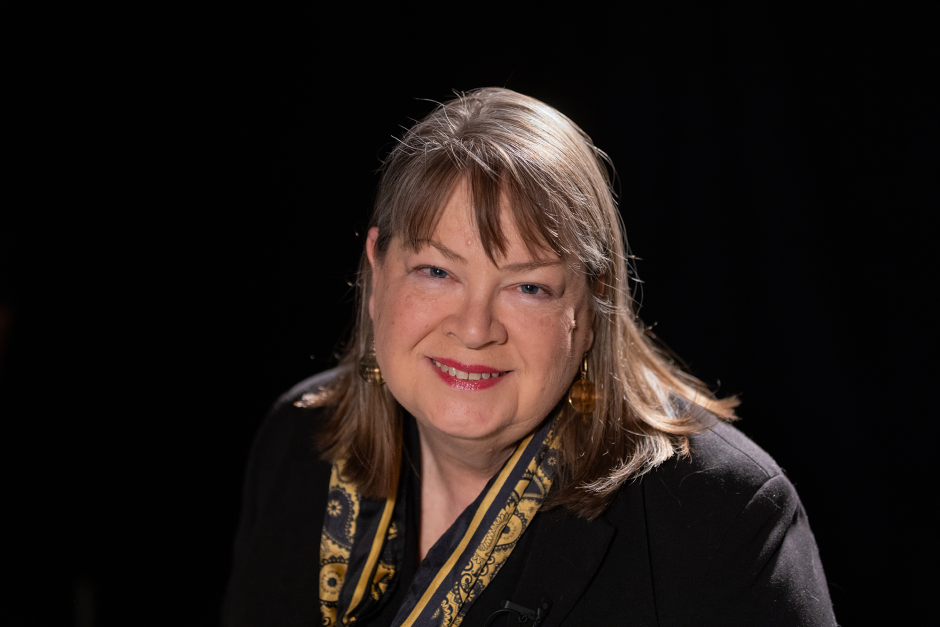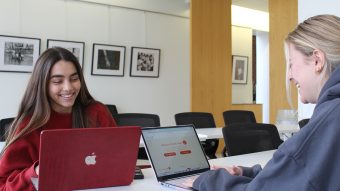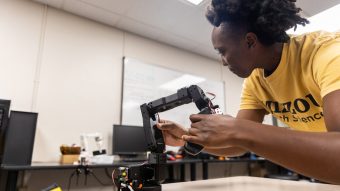
April 9, 2025
Contact: Brian Consiglio, consigliob@missouri.edu
Photo by Abbie Lankitus
At the University of Missouri, students can get involved in research as soon as they step on campus. It all starts at the Office of Undergraduate Research, a one-stop shop for resources and programming to help students take advantage of experiences that open doors for personal and professional growth.
For decades, Director Linda Blockus has been on a mission to provide Mizzou students with opportunities to learn, collaborate and explore their interests — alerting Tigers to jobs, internships, summer programs, funding opportunities and potential research mentors to support them along the way. She even teaches a class on how students can communicate the value of their research to the broader public.
Whether students want to attend a plant biology conference in Hawaii, spend a summer in Germany, share their art at a campus-wide event, present a poster at the state capitol or search for a cure to a disease, Blockus works to enhance Mizzou’s research infrastructure — often behind the scenes — to help students take their education to the next level.
Her efforts have helped countless students grow their professional networks and launch careers through hands-on experience. For those who take advantage of those opportunities, undergraduate research is often a highlight of students’ time at Mizzou.
“The many practical benefits of getting involved in research include potential for scholarships and wages, academic credit, letters of recommendation and faculty mentorship,” Blockus said. “But what might be just as important are the personal benefits, including the development of career-readiness skills such as critical thinking, problem-solving, teamwork, communication, and clarifying your career and personal goals.”
Over the years, Blockus has created a number of programs to open research doors for Mizzou students, including:
- Freshman Research in Plants (FRIPS), funded by the National Science Foundation, connects incoming Mizzou freshmen with plant biology research labs and professional development opportunities.
- Maximizing Access to Research Careers (MARC), funded by the National Institutes of Health, supports underrepresented students in biomedical research.
- Arts, Social Science and Humanities (ASH), a collaboration between the Honors College and the Office of Undergraduate Research designed to support teams of 6-10 students to work on a multi-year project.
- Mizzou’s Summer Undergraduate Research Program, which hosts both Tigers and visiting students from other universities across the world. Participants are mentored by Mizzou faculty while they conduct research on Mizzou’s campus.
These experiential opportunities set Mizzou apart.
“For 35 years I have seen firsthand Mizzou’s efforts to prioritize high-impact educational practices, including undergraduate research, study abroad, service learning, internships and leadership opportunities,” Blockus said. “Mentorship can thrive with undergraduate research in a way that doesn’t always happen in the classroom. The faculty here at Mizzou genuinely enjoy including undergraduate students in their research because they truly believe in the land-grant, educational mission of the university.”
In part due to Blockus’ efforts, Mizzou is now an enhanced institutional member of the Council on Undergraduate Research (CUR), which indicates the importance Mizzou places on student engagement in scholarly research. Any Mizzou faculty, staff or student can enroll in free membership in CUR and benefit from professional development opportunities, publications and sharing of best practices.
Seeing the fruits of her labor
When Blockus first arrived at Mizzou in 1989 to work as Mizzou’s first academic advisor in the biology department, there was no centralized office for undergraduate research resources and programming.
“There were opportunities for undergraduate students to get involved in research at the time, but things were pretty siloed,” Blockus said. “I was supporting undergraduate research initiatives in biology, biochemistry, physics, math and science education, but I knew I wanted to expand access to resources and programming for students campuswide.”
Since becoming the inaugural director of the Office of Undergraduate Research in 2002, Blockus has worked to greatly expand access to federally funded research opportunities for undergraduate students at Mizzou.
“There are always ways to keep raising the bar, and it starts with making sure all students have access to opportunities, regardless of their background,” Blockus said. “We are here to transform lives, no matter where you are starting from.”
And with each graduating class, she continues to see those efforts pay off.
“To watch our FRIPS program, our MARC program and our summer research program grow over the years has been very rewarding, and now we even have prospective students coming to Mizzou because of these programs we started from scratch,” Blockus said. “When these students graduate, those experiences will serve them well regardless of what they go on to do in their lives.”
For Mizzou students interested in undergraduate research, here are four ways to get started.



